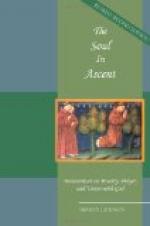History confirms the witness of experience. The strong man has always gained strength by struggle. The story of a few of the preeminent teachers is impressive reading. Mahomet knew the bitter pangs of poverty; Epictetus was a slave; Socrates was regarded as a fanatic, if not a lunatic, by most of the people of Athens; Siddhartha is said to have been a useless and luxurious young man until, wearied with the monotony of his father’s palace, he ventured into the larger world and saw wherever he went poverty, sickness, death. He was startled into activity by the want, woe, and misery through which his pathway led.
Nearly all moral and spiritual leaders have had to suffer and thus grow strong. Mere genius has done little for human progress. It has made physical discoveries, but seldom touched the sphere of the soul. Elijah heard the voice of God in the midst of the terrors of the wilderness in which he was ready to die; Isaiah shared the usual fate of reformers and spoke his message into the ears of those who returned insult for warning. The story of Job is a long tragedy,—the world’s tragedy, the tragedy of the soul in all ages. What deeps of anguish Dante fathomed before he could begin to write! Who can read the story of “Faust,” as Goethe has interpreted it, without feeling that in it he has given the world in thin disguise much of his own life-story? Shakespeare alone, of men of genius of the first rank, seems to have learned comparatively few of his lessons in the school of suffering. But, possibly, if more were known of Shakespeare, it would be found that Lear, Macbeth, and Hamlet are but the expressions of lessons learned as he fought life’s battle.
The “In Memoriam” of Tennyson, the “De Profundis” of Mrs. Browning, and the rich and glorious music of Robert Browning could have come only from souls which had been profoundly moved by grief and pain. All men listen most attentively to those who have gone farthest into the dark shadows.
The austere in human experience always accomplishes a purpose of blessing; and the soul comes into such an environment, not for the purpose of being humiliated, but in order that its strength may be developed, its sight clarified, and its powers perfected.
Thus we reach a rational basis for optimism. It has been said that optimism must not only show that beneficent results are being accomplished in human life, but it must also justify the means by which such results are achieved. It is not enough to show that all will be well in the end; it must be shown that even grief, pain, loss, and death are ordained to be the servants of man. This is evident to all who allow themselves to reach to the deeper meanings of their limitations and sufferings.




